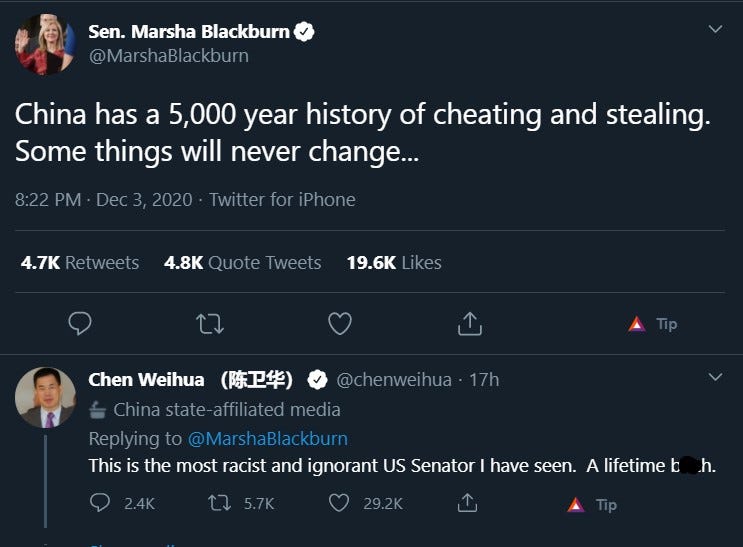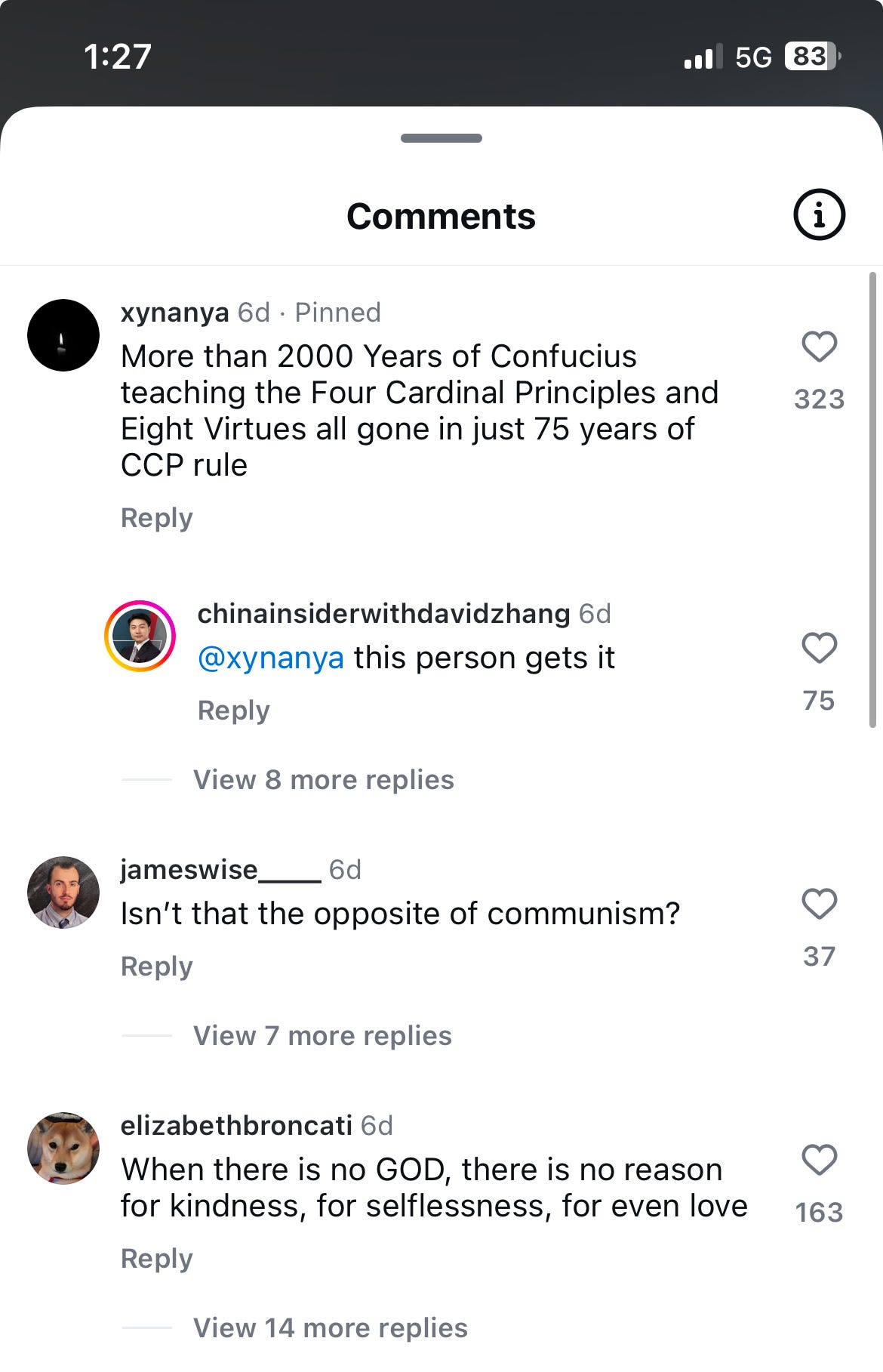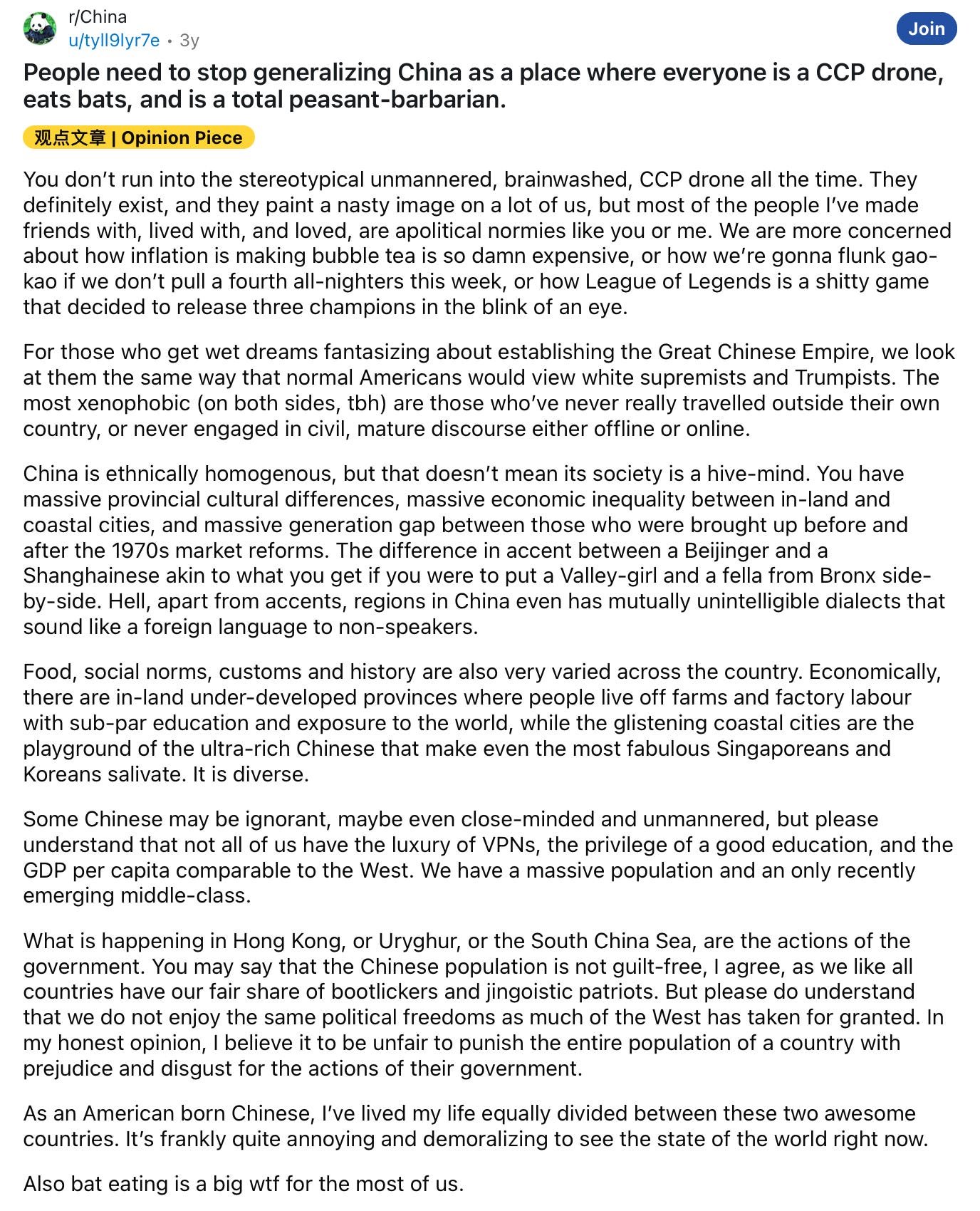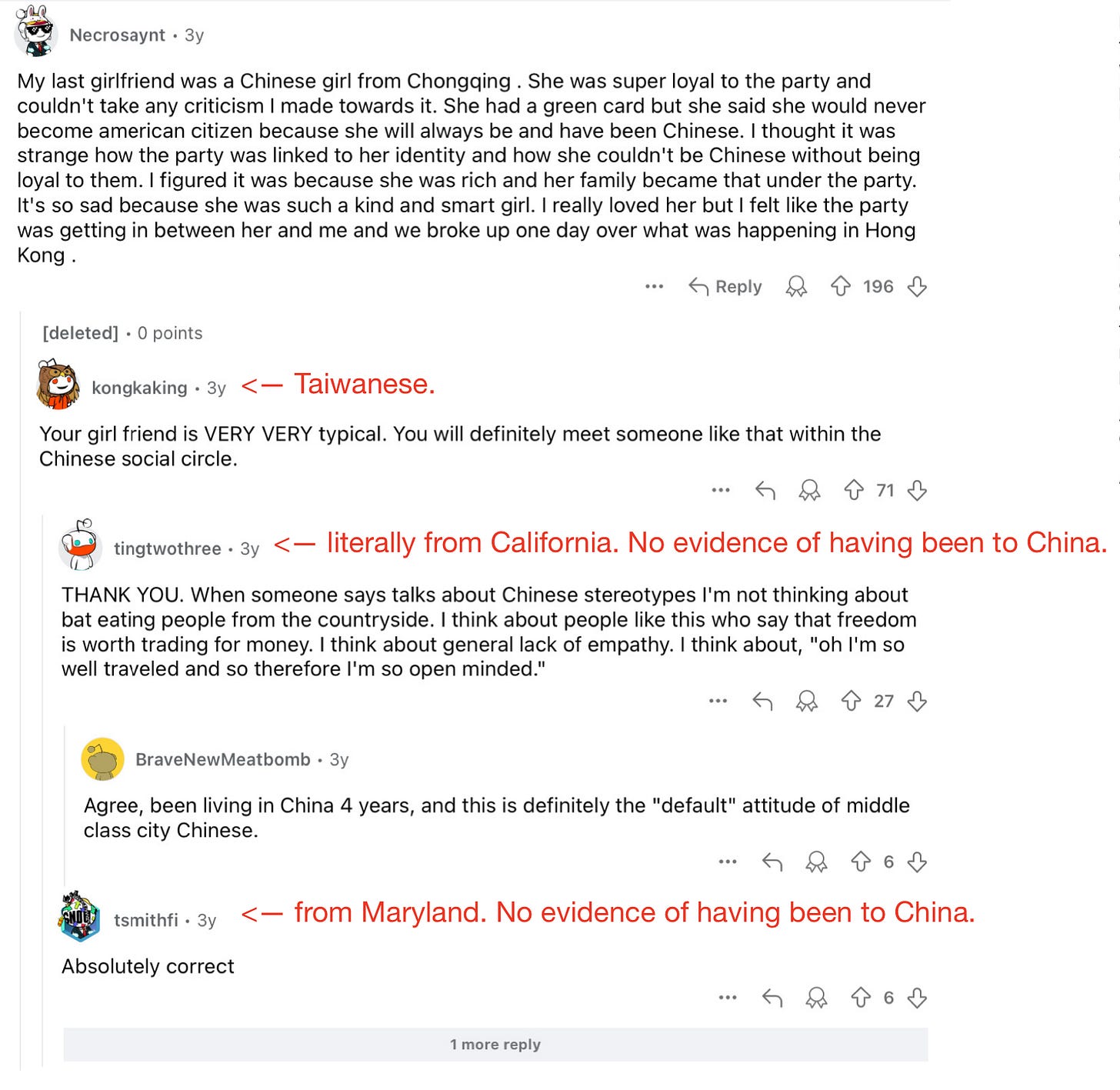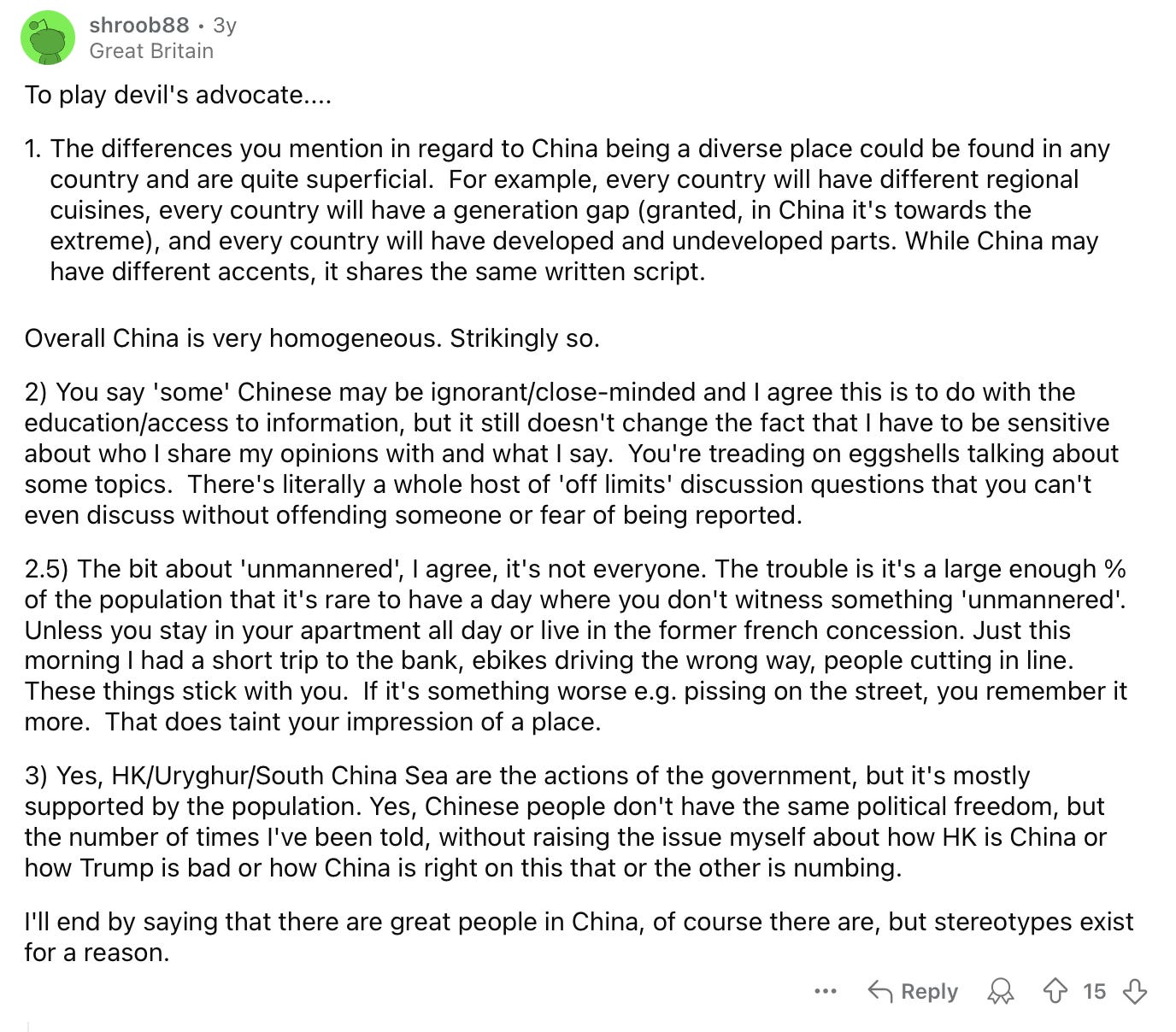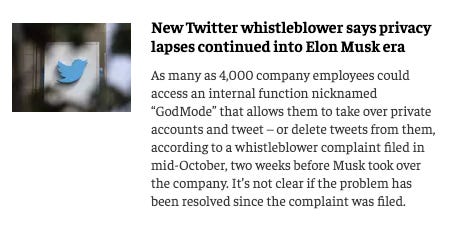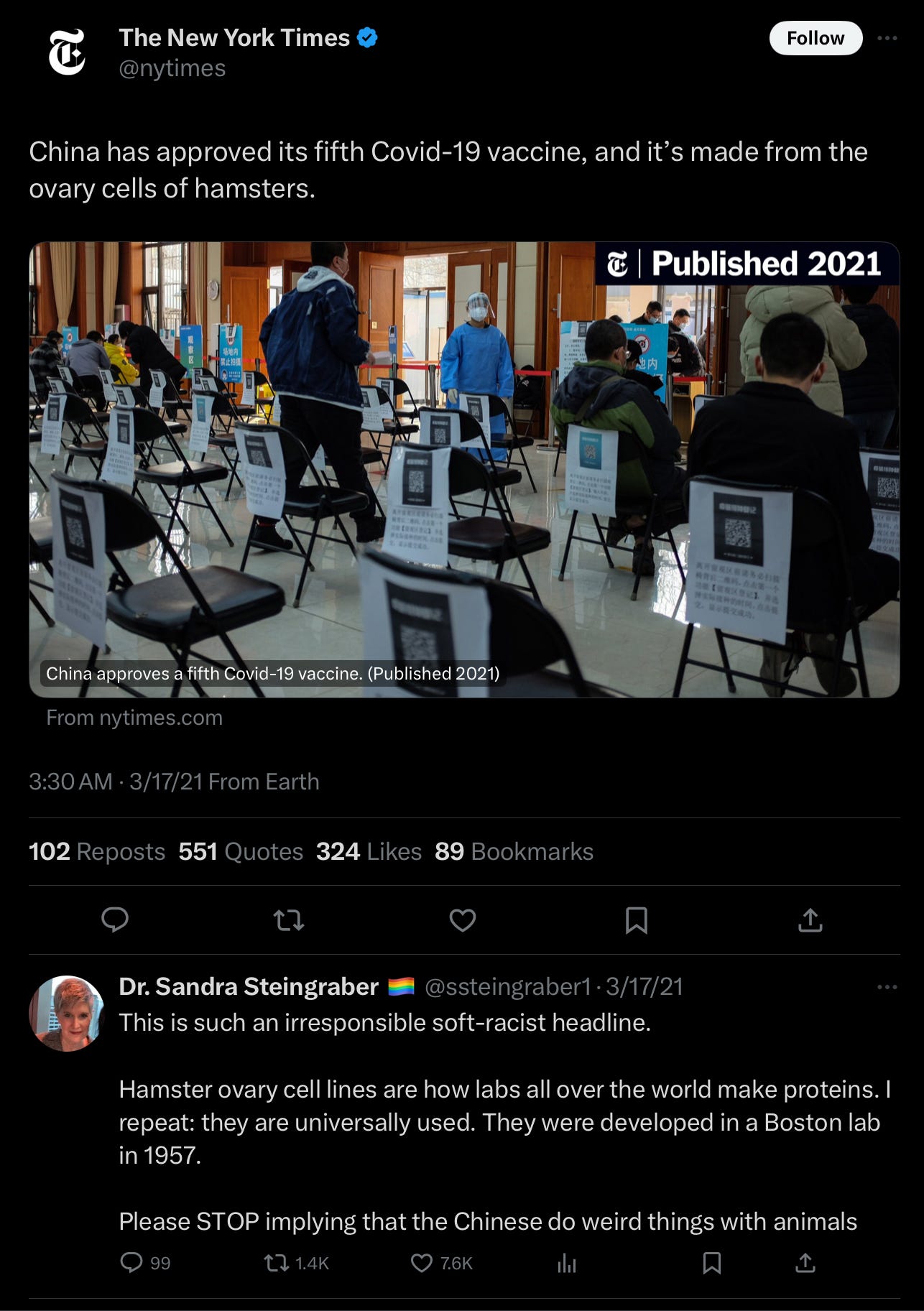What's social media's beef with China?
The CCP is obviously bad. But why must our culture get caught in the crossfire?
Disclaimer
This is not a piece defending China. You will likely never see me writing such a piece.
What this piece is about, though, is our approach to discussing China. The clear intent of most anti-China content on social media is to (rightfully) call out the government and its many destructive decisions. But so much of the commentary regarding the country goes far beyond what’s necessary to have a productive and accurate discussion about its abuses.
I will not be able to cover all of my gripes in this piece—this will likely be a multi-part series. But even in those many parts, I won’t write about absolutely every problem I think exists, since there are a lot of things in social media discussions on China that bother me but aren’t productive to write about. For instance, so many social media users are genuinely just racist towards Chinese culture and couldn’t care less about the CCP’s actions. But social media xenophobia like that exists against every country (some countries, like India, arguably have it worse). There’s also little we can do to cure that racism. I also don’t support every way the media demonizes China, especially economically—but that’s obviously subjective and based on my personal beliefs (which are very left-leaning, like China’s economic policies).
With that said, there are two elements of anti-China discourse that are both completely unnecessary and elements I’ve never seen in a political discussion surrounding another country:
No other country receives borderline racist social and cultural attacks disguised as indictments against their ruling government like China does.
No other country receives negative news coverage designed to exploit stereotypes and racist cultural beliefs like China does.
The rest of this piece will discuss both these phenomena in great detail and show their significance in the China discourse—as well as how they doom the societal view of Chinese culture far more than what’s needed to hold the CCP accountable.
If you’re reading this in your email, open it in your browser. It exceeds the email length limit.
Part 1: The Blurring of the Political/Cultural Line
Earlier last week, I was rotting on Instagram Reels when I discovered a series called “China Fakes Everything.” I thought that was already obvious, given the copious amount of misinformation furthered by the government. I examined the account closer, though, out of curiosity. It wasn’t about the government at all.
This “China Fakes Everything” series has a whopping 25 parts and counting. Before I wrote this piece, I sat down and painstakingly watched through every single part of his series I could find on the “chinainsiderwithdavidzhang” account (he posts multiple videos a day, and they’re all dedicated to negative news on China, so it was quite difficult to scroll through all this content without losing my place). The result of this annoying process was that the majority of his complaints about China weren’t even about the Chinese government, but attacks on Chinese companies, or worse, people. The actual target of his content was in an unclear grey area: was he actually trying to criticize the government? Or was he spewing hatred against the entire country—including its citizens?
The closest thing I saw to a governmental complaint was complaints about construction companies, which are often contracted by the Chinese government. A common misconception is that the CCP controls business in China—it does place a certain amount of regulations, but corporations have mostly free reign over their practices (this is why things like child labor are so common in the country).
A good portion of his attacks cover China’s flimsy and low-quality construction: foam walls, sinkholes in the streets, etc. Private construction companies have nothing to do with China’s corrupt governance, though I will cut this section more slack since their recklessness can be chalked up to the incentive to earn government contracts. (Keep in mind, China’s infrastructure spending is 4.8 percent of its GDP—it’s a world leader on this front, meaning if anything, low-quality buildings are the exception, not the norm.)
But it only gets worse from there. He also shows Chinese companies piping fake crab stuffing into crab shells. He shows them dipping cabbages into oil, or not washing the insides of trucks transporting soybean oil after they’ve carried refined gas. This is terrible—but it’s done by companies, not the government. This time, there is an even further degree of separation between the companies and the CCP, since there’s no way the Politburo’s ordering private food processors to make fake crab meat.
Most horrifyingly, though, he eventually devolves into making attacks on individual Chinese people, without even an attempt at applying governmental abuse to their actions. He talks about how Chinese social media users catfish people using AI filters—this exists in every country with technology, and it’s carried out by individual users. He talks about how small street vendors will replace high-quality alcohol with cheap substitutes by making tiny holes in their packaging to funnel the liquid out. Are top CCP officials personally traveling to such vendors to make sure this is happening? Definitely not! This content is not making his viewers hate the government, but rather the people and what they think is the culture of China.
Accounts like “chinainsider” are terrible. While this account seems benevolent on the surface, the lack of attention to detail and fact-checking is so striking that anyone with a few minutes and critical thinking abilities can pick apart his most popular videos and series. But his popularity exploits everyone else—he has 118,000+ followers and receives an average of 50,000 views per video, with his most popular ones reaching over 10 million. I won’t deny that there are positive elements to accounts like this. A lot of his videos expose the CCP’s abuses, like the mysterious disappearances of whistleblowers or their misinformation to the Chinese public. But his attacks are so much stronger than criticisms of the government that they reach the point of anti-Chinese racism—ironic, considering he is Chinese himself. I see three ways his rhetoric leads to anti-Chinese—not anti-CCP—sentiment.
One, his videos attempt to generalize certain poor actions to all of China as a whole. This is me taking him in the most optimistic way I can—assuming everything he says about China is true and his content is posted in good faith. After nearly half an hour of poring over his Instagram account, I don’t see a single video exposing the CCP, the incentives of Chinese companies, or the institutional processes in China at large. What we get instead are videos (with no sources, mind you) of individual Chinese companies or people being misleading, and his content insinuates that this behavior is a pattern across all of China. But everything he says about China can be easily applied to other countries. Sinkholes open up and infrastructure collapses often in the US. Studies have found that Subway’s tuna has no tuna DNA, in the same way that Chinese companies pipe fake seafood into crab shells. His role in holding China accountable is highly nebulous he never criticizes any process that makes China so bad.
Two, he tries using the actions of the CCP as an excuse to attack Chinese culture. My suspicions about his racism were confirmed with his other popular series. It’s titled “Chinese people are miserable.” Again, there are some merits to this series—it partially discusses the widespread labor abuse that causes people to work backbreaking hours for low wages in terrible conditions. But the other half of this series is where he posts a video of Chinese people fighting over food at a buffet, and saying: “Look what the CCP has done.” He says that years of famine during Mao’s rule—over 60 years ago, mind you—have supposedly turned Chinese people into animals who unleash a primal instinct at the sight of food, and they’ve passed down that culture to their descendants. This is where he crosses the line from good commentary to straight racism. He is openly trying to call out the actions of Chinese people, and (very ineffectively) justifying it by saying those actions are a byproduct of Chinese governmental abuse. Excuse this behavior however you want, but demeaning the actions of a certain culture will always be xenophobic—it doesn’t matter what the greater purpose is. But that video is on the better end of this “Chinese people are miserable” content line. In other clips from those videos, he shows Chinese people having street fights and says that in China, small arguments often devolve into physical scuffles. What does that have to do with the government?
And this final clip made me laugh out loud—he just shows a guy floating around in a flood, holding propane tanks to survive. Is he trying to say the Chinese government contacted God to smite this poor guy? The rest of this video is genuine commentary about labor conditions and hours, but it inexplicably ends with a clip that has nothing to do with the stated purpose of his account.
Third and finally, he knows exactly what type of audience he should be pandering to. A good portion of his content is actual grievances against the Communist Party. A lot of people who follow him do so because they dislike the actions of the powerful ruling elite in China. But the same people who see news story after news story about why the government is bad are immediately recommended content talking about the negatives of Chinese culture. One thing leads to another, and these people fall down a rabbit hole of radicalization and they eventually end up hating every element of China—not just the government, but the traditions and ultimately the people. Sure enough, take one look in the comment section and you see this radicalization firsthand. In the video of Chinese people fighting over buffet food, the comments are dominated by people saying “Christianity has rules against this.”
If he cared about spreading good discourse about China, David would respond to such attacks and tell them that religion or innate good and evil are not the issue, and it’s the CCP that’s the problem. After all, wasn’t that the whole point of his video? He doesn’t do that, though. And it’s not like he never responds to comments. On the very same post, he pins and replies to a comment saying that Chinese Confucianist and communal values have been destroyed by the CCP and the culture has been morphed into one of selfishness. He says: “This guy gets it”—further enabling an attack on the individual behavior of Chinese people. All while doing that, he lets blatant racism go unnoticed because Christian-supremacist views and clicks make bank.
He even plays into it! He posts a video about a Christian woman who saved a bus full of Japanese students from a radical anti-Japanese attack. That’s heroic and noble, but if your problem is with the CCP, why does her religion matter? The tactic worked—the video got 80 thousand views and the comments were filled with Christian messaging. The final comment was just the cherry on top.
At this point, I’ve given up on trying to think this account was created and is managed in good faith. He’s exploiting and profiting off the destruction of a culture, all while pretending he’s making the world better by bringing the CCP down.
Looking through this one account and its many posts made me wonder something. If content like this is the prototypical anti-China media, its main profit model combines governmental backlash with cultural attacks, and its main audience is Sinophobic Westerners who feel a sense of social superiority over Chinese people, just how much anti-China is truly made and consumed in good faith? How many people who oppose the Chinese government truly feel sympathy rather than intolerance for the people?
I was a chronic Reddit scroller in middle school. I don’t like going back to that time and reliving what my odd political views were (CENTRIST 😭), but I do recall subscribing to a subreddit called r/China. It produced pretty good content—calling out the state abuse of Uyghur Muslims in Xinjiang, their corrupt response to the Hong Kong protests, etc. But the subreddit eventually drove me to leave one Chinese New Year’s, when posts celebrating the holiday became downvoted and flooded with comments saying things like “today shouldn’t be celebrated.”
This wasn’t just one isolated incident—I came to notice that it was part of a pattern in this community. Mixed in the middle of genuine posts criticizing the government were posts openly using stereotypes and not even trying to veil them.
That gave me a hypothesis: a lot of the people spewing anti-China rhetoric on social media aren’t doing it for completely benevolent reasons. Even if they have some good intentions, their sentiments against the Chinese government eventually spill over to xenophobia and genuine racism. So I looked into the profiles of a lot of these racist posts on r/China to see what type of people were making them. If you’re wondering why it’s been a while since my last post, I had to scroll through the Reddit history of countless users to come up with this piece.
Keep in mind the audience point that I made while covering “chinainsider.” The people consuming these racist posts are the same users who subscribe to a subreddit dedicated to spreading negative news about the actions of the Chinese government. Eventually, their sentiments blend, sending them down a dangerous pipeline.
The first post I examined was this “Basic millennial Chinese woman starterpack.” For those not familiar with this meme format, “starter packs” are a visual list of common characteristics associated with a certain idea—for example, the “things I thought were huge problems as a kid starter pack” includes quicksand, the Bermuda triangle, and the Loch Ness Monster. When it’s used in this context though, it’s just straight racist—no different than if someone made a “Chinese person starter pack” and put “good at math, brings smelly food to school, gets really good grades.”
This means an insensitive post got nearly 2,000 upvotes from a community dedicated to China—but who are the users giving posts like this support? See for yourself.
When people who didn’t grow up Chinese and some who haven’t even lived in the country are supporting and confirming posts attempting to reaffirm stereotypes, that just exposes their racist intentions.
It only gets worse from there. I thought this community had redeemed itself when I saw a post complaining about the negative stereotypes used in r/China getting over one thousand upvotes. But I looked into the comments and realized that I shouldn’t have immediately thought so highly about the users in this subreddit.
Here’s the post itself (which makes very valid, accurate points).
And here are two of the top comments.
Let’s start with the first user, Necrosaynt. The entire point of the post is to say that not all Chinese people fit the stereotype of being brainwashed CCP goons who listen to everything the government says. His comment? It’s the equivalent of “I’m not racist, I have a black friend.” He argues that since he’s interacted with one Chinese individual who fell in line with the stereotype, the generalization must be ok.
Then the second reply, coming from a person from Taiwan, says “Yes, this stereotype is true, this is a typical Chinese person.” This is quite racist, but I’ll cut him some slack since he’s from Taiwan and has likely interacted with a great deal of Chinese people. But I can’t find a way to excuse the third reply. A guy from California, saying “Yeah, my Chinese stereotype is a person with no empathy, who doesn’t believe in freedom, and thinks of themselves as open-minded when they’re not.” When you have people who’ve never been to China confirming the accuracy of posts about what Chinese people act like, that’s when you cross the line.
And then you have this reply from a supposed expert:
In what other situation does a political discussion regarding the actions of a country end off with the line “stereotypes exist for a reason?”
This section has gone on long enough. Let’s transition from racist individuals and communities to implicit racism within recognized news media.
Part 2: The Profitability of Sinophobia
You could easily say that these actions are perpetrated by fringe racist accounts and not the entire news media as a whole. I wish that were true since writing this piece wouldn’t then be necessary. But even the biggest news networks—hailed as unbiased, accurate, and objective—feed off the very same anti-China sentiments and stereotypes as terrible accounts like chinainsider. I’ll give you several examples of such patterns in news media from what I can immediately remember.
2.1: COVID
Let’s start with the COVID-19 pandemic. The origins of the coronavirus are still widely disputed, but it’s generally accepted that the disease was passed from some sort of animal to humans. An alternative theory is that COVID-19 escaped from a lab in Wuhan as researchers were examining the disease.
Both of these theories have credible research backing them up. But news media have blown up both of these theories to their absolute extremes to weaponize existing anti-China stereotypes in a desperate attempt to get more clicks.
First, you have the disgusting tabloids capitalizing off of this opportunity and garnering clicks through blatant racism.
Even if coronavirus truly did come from people eating bats, the complete lack of context is what’s most striking—the second headline isn’t even about eating bats in China, the woman in that video who had to apologize was doing a travel show in which she ate it as a delicacy in Palau.
But that’s just the tabloids, right? Reputable news sources wouldn’t go out of their way to demonize China like this.
Nope. On the surface, this seems less openly racist than the other things I’ve discussed, but it plays off a centuries-long stereotype that China is full of evil, cunning, mad geniuses attempting to bring about the downfall of Western civilization.
On top of that, the articles’ headlines lead with the claim that China created a bioweapon—then afterward, they caveat that the allegation comes from an individual Chinese whistleblower. Let’s look a little closer into the Economic Times, and how they treat claims against China with claims against any other country or company.
Then, here’s how they frame allegations against China:
It’s a bit hard to notice, but the message is very clear. The allegations against China are more fully fleshed out, whereas the allegations against non-Chinese entities are a lot more vague. When it’s against American and Indian companies, they use words like “privacy lapses” and “mismanagement.” When it’s against China, they are as explicit and detailed as possible with their accusations.
When it’s against non-Chinese institutions, the caveat comes before the allegation. When it’s against China, the allegation comes before the caveat. This is essentially a difference between “innocent until proven guilty” for the non-Chinese groups, whereas, for China, it’s “they’re guilty, except for this one caveat.”
2.2: “Animal Abuse”
On top of the idea that Chinese people eat exotic animals not meant for consumption, there’s a large narrative that they also treat animals badly in general. Look at this article from the UK-based Guardian, for example:
This article makes two allegations against Chinese authorities. The first is that they’re taking dogs left unattended in public spaces were being captured and taken away. Yes, of course they were. Animal Control in the United States is authorized to do this when a stray dog is reported unattended and not on a leash. The UK has “dog wardens” that can collect stray dogs.
The second allegation is that social media posts show landlords breaking into homes and taking dogs away. There is no evidence provided anywhere in the article for this, and no links to said videos. Also, using social media posts as evidence is something I’d expect to see out of a BuzzFeed article—not one from The Guardian.
The rest of this article is also incredibly misleading. The article implies that everywhere in China, animal abuse is an incredibly widespread problem. The caption on the image reads “Counties from Henan to Sichuan have announced that unattended dogs will be captured.” When you read the article, it only mentions those two counties, even though the opening line states “Local governments across China” have taken such actions. And why does the article say “captured” and “crackdown?” I found a similar article from The Guardian discussing a “dog warden” in the UK, a person with the same job as the officials “capturing” stray dogs in China. Look at the language The Guardian uses to describe his job:
But what are the Chinese officials doing worse than Tumer Hassan that makes The Guardian able to use such comparatively negative language against them? The China article, which is disorganized throughout its entire duration, ends with the line:
“Internet users also called on the public to go to the State Council website and leave a message asking the government to stop abusing and killing stray animals, to reasonably disclose the way stray cats and dogs are handled, and to call on the state to legislate for the protection of animals.”
However, the article itself provides no information that the government kills stray animals. It doesn’t provide evidence that the government doesn’t give back these stray animals to their owners, just like Tumer Hassan does. Apart from the unsubstantiated social media claims, the only semblance of bad facts it can provide to indict the Chinese government’s actions is this:
“It was reported that a university in Liaoning Province fired a security guard who strangled stray dogs on campus. Chinese local news reported that students killed stray dogs in a dormitory in a vocational college in Sichuan.”
The article puts up hefty allegations against the Chinese government (and implicitly, the culture of animal abuse) saying that stray animal killings are a pressing enough issue to become a crisis that must be addressed. But it can only provide two cherry-picked examples of such a thing happening? Keep in mind, this isn’t even the actions of the government—they’re exposing the animal abuse perpetrated by a private security guard and college students, two things I can find happening just as frequently in the United States with just a simple Google search:
But even though these two things happened within a week of each other in the United States, it’s not a pressing enough issue here for The Guardian to write an article about “calls for the government to stop abusing and killing stray animals.” Only in China is that level of fearmongering permitted in the media.
Part 3: The Destruction of Discourse
It’s easy to say that all of this is unintentional. When you post videos showing China in a negative light, you’re bound to get racist commenters who only stay for bad news regarding their least favorite country and culture. It’s also easy to pass this off as necessary for discussion regarding China in the first place. But there are three ways in which this type of commentary simply goes too far.
First, it shifts attention away from more important issues. “chinainsider” attempts to justify his attacks on Chinese culture by tracing such behavior back to the actions of the CCP, like saying Chinese citizens are so starved for resources that it’s given them an inherently violent nature. The issue here is twofold. First, the link between the CCP and negative Chinese stereotypes is nebulous. Especially when it comes to things like fighting over food at buffets, content like his contributes far more to narratives that Chinese people “have no manners” than it does to accountability against the government. Second, his audience focuses very little on the CCP’s actions. As demonstrated by his comment sections—and the ones I found over on Reddit—most commenters are completely racist and fueled by a sense of cultural superiority. This is especially important in cases like the COVID-19 pandemic. The reason so many resources were concentrated on pinpointing the origin of the coronavirus was to prevent future outbreaks. But so much attention was improperly diverted from those causes to that of blanket hatred against Chinese populations and culture, polluting proper conversations regarding stopping incoming pandemics.
Second, it alienates possible supporters of the anti-CCP cause—especially within China and for Chinese-Americans. A lot of people who have lived in mainland China, and especially those who immigrated out of it, don’t support many of the actions of the CCP. People within China and those who have close ties to the country are also the critical group necessary to hold China accountable since they have the most sway over the government there. But so long as you have people like me in 8th grade—exiting discussions surrounding Chinese abuse due to the copious amount of negative cultural sentiment that gets mixed in—you can’t flip anyone to the anti-government cause. Evil also begets evil here. Due to the cultural misinformation in American media regarding Chinese populations, Chinese internet users are happy to reciprocate. I have a lot of Chinese family friends, and I heard a lot of conversations regarding America when vacationed in China last summer. There’s a stereotype there that Americans are all obese and that it’s a dangerous country full of psychopathic school shooters and drug users present at every corner. Overcoming cultural animosity is the first step to creating positive cooperation between the two sides and de-escalating any potential conflict or harmful action.
Thirdly and most importantly, though, cultural attacks like this directly drive hate crimes and negative sentiment against Asian people everywhere. Asian-American hate crimes in 2020 spiked up after then-President Trump made a tweet referring to COVID-19 as the “Chinese virus.” Even if the racism is implicit, language matters— news headlines and public discussions that linked the coronavirus to China might have been responsible for such anti-Asian attacks as well as boycotts of Asian-run restaurants and businesses in the United States. In 2020, some of my closest family friends experienced such attacks firsthand. But their experiences represented just a few incidents out of nearly 11,000 that happened during the lockdown period between 2020 and 2022. They were lucky to come out of such experiences with their lives, as several victims of such acts died as a result.
My message is simple. The Uighur oppression in Xinjiang is the fault of the CCP, not the Chinese people. The response to protests is the fault of the CCP, not the Chinese people. And the spread of COVID-19 is the fault of the CCP, not the Chinese people. When you discuss China, focus on the government, because the negative situation is their fault. If you ever take shots at China, make sure you know what you’re aiming at—because if you don’t, innocent people will be in your crossfire.




